Hoping having this blog helps me be more productive and stop procrastinating. Journaling, studying and reading. 🤓 l Spanish/English l sideblog to @callmeetcetera
Don't wanna be here? Send us removal request.
Text
Took me until about halfway through college before I realized “study” means “play with the material in a variety of ways until you understand it” and not just “read the assigned chapters and do the homework” and I think that probably should have been discussed at some point prior to that.
88K notes
·
View notes
Text
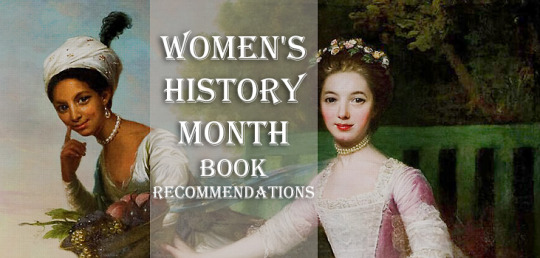
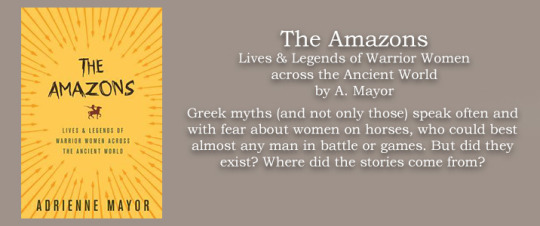
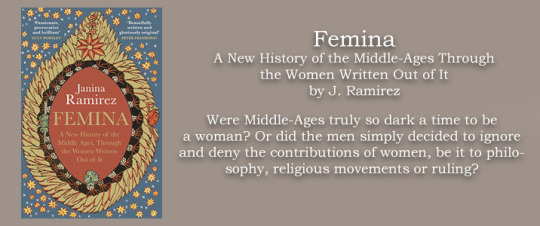
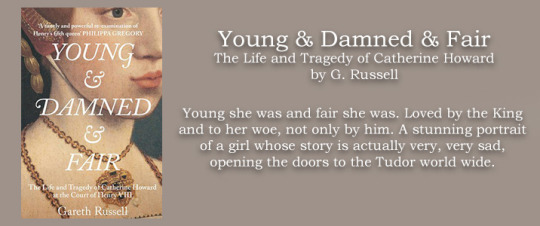
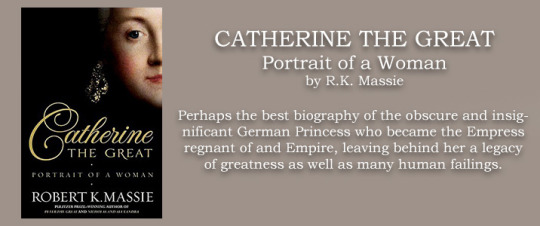




Feel more than free to add your own recommendations!
21 notes
·
View notes
Text
would love to turn people on to nz on screen, a free archive of new zealand and māori content with over 4500 titles!
the site is accessible in both english and te reo, and it includes over 500 films, 3000 tv series & specials, 2000 documentaries, as well as history series & specials, chat shows, musicals, lgbtq+ content, standup, children's shows, historic news & sports, and more :)
new zealand and māori filmmaking & content, particularly from before the late 2000s, can be exceptionally hard to track down and haven't been given the archival attention they deserve, so this is an amazing resource!
12K notes
·
View notes
Text
a genuinely interesting thing would be to see the plot of over the garden wall, but from greg's pov
it's established that wirt and greg aren't necessarily seeing the unknown in the same way, and the show as we see it is largely wirt's pov. what does the world look like through greg's eyes?
299 notes
·
View notes
Text
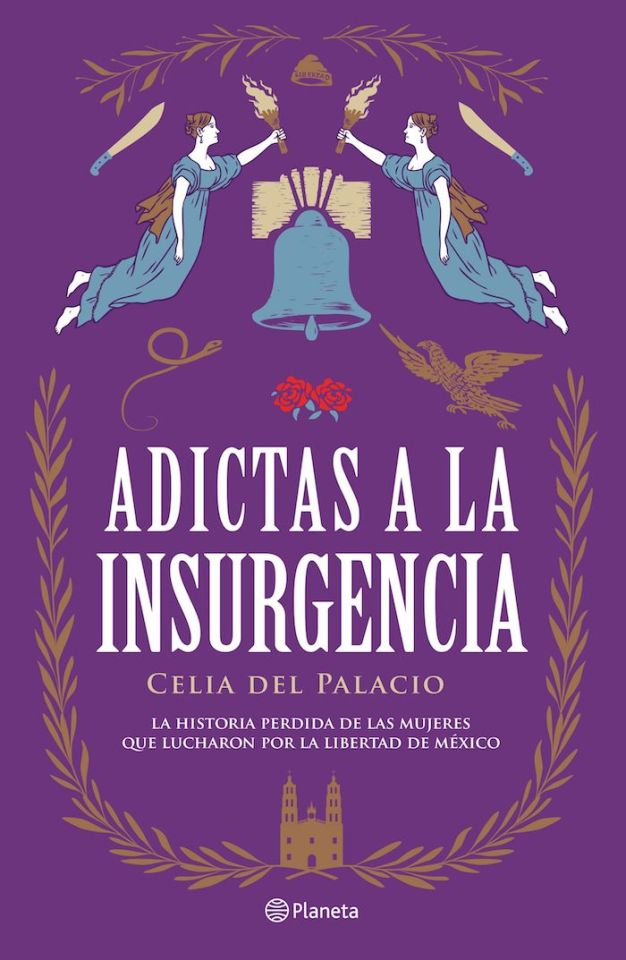
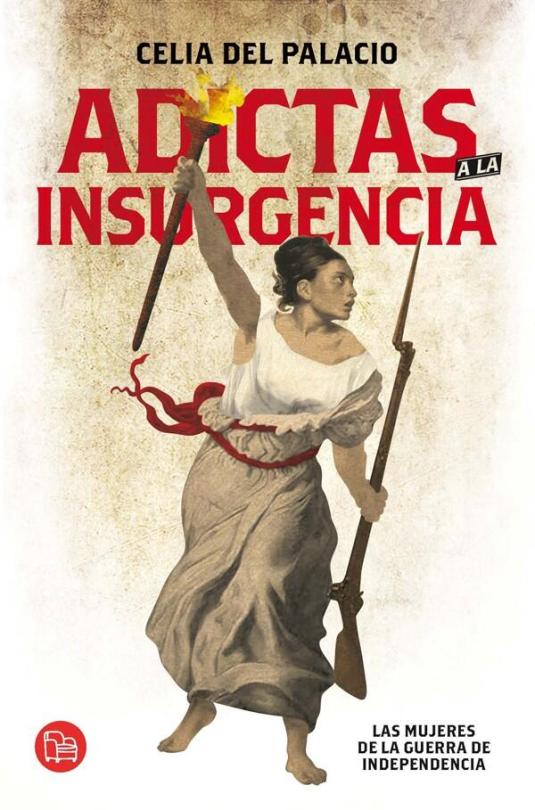
Adictas a la insurgencia
Celia del Palacio
La historia perdida de las mujeres que lucharon por la libertad de México.
La lucha por la Independencia de México convocó a un sinnúmero de mujeres; sin embargo, su indispensable participación en la historia ha sido reducida, en el mejor de los casos, a breves menciones en los libros o simplemente dejada al olvido.
Celia del Palacio, novelista e historiadora, recupera las vidas y los nombres de todas estas mujeres de armas tomar que son fundamentales para comprender el destino de la causa insurgente, las pasiones y los anhelos que la animaron.
Josefa Ortiz de Domínguez, Leona Vicario o la Güera Rodríguez son sólo algunas de las más conocidas «adictas a la insurgencia», como se les clasificó en su tiempo.
Pero este apasionante libro, muy al estilo de Vidas imaginarias de Marcel Schwob, también rescata las historias de María Luisa Camba, la Fernandita, concubina de Hidalgo que lo acompañó en su levantamiento vestida de hombre; las Once Mil Vírgenes, habitantes de Tepozán que se ocupaban de seducir a las tropas realistas para convertirlas a la causa rebelde; las mujeres de Miahuatlán, quienes al ver a sus maridos e hijos presos por el ejército imperial los rescataron con lo que tenían, piedras y sartenes; entre muchas otras mujeres que dieron la vida y empeñaron la libertada para alcanzar sus ideales.
13 notes
·
View notes
Text
In the early 70s Sesame Street was created with an eye towards educating poor, inner-city children for free, and became a massive hit with all children. In 2016, faced with going off the air forever after facing conservative efforts to destroy public broadcasting since basically its beginning, new episodes became a timed exclusive for premium cable network HBO. In 2022 HBO Max, newly merged with and taken over by reality TV channel Discovery, removed Sesame Street episodes and spin-offs from streaming as a tax write-off and scheme to avoid paying residuals.
138K notes
·
View notes
Text
Download this easy DIY clothing repair guide (only 10 pages) from Uni of Kentucky
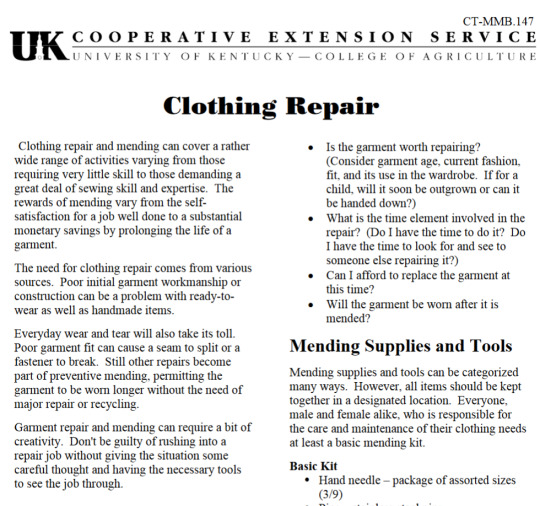
link to PDF
79K notes
·
View notes
Text
Deutschribing Germany
Education
Education in Germany is free and compulsory between ages six and sixteen. States (Länder) are largely responsible for education, with the federal government playing a minor role.
Types of schools
The vast majority of children attend state schools, but there are private schools (Ersatzschulen) as well. The latter have very low tuition fees and are also subsidized by the state, which effectively makes them privately-run schools funded by the state. Some are run by religious groups.
School terms
The school year is divided into two terms (from August to January and from February to July) and starts after the summer break, which differs from state to state but usually finishes in mid/end-August. Children have twelve weeks of vacation in addition to public holidays. Exact dates differ between states, but there are generally six weeks of summer vacation, two around Christmas, two around Easter, and two in the fall during the harvest season, since farmers used to need their children for field work.
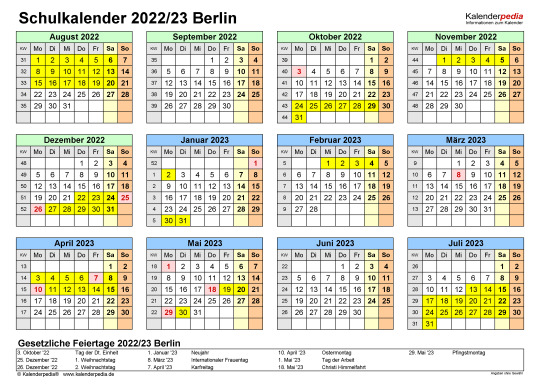
Grades
The German grading system is as follows, from highest to lowest: sehr gut (1.0–1.5), gut (1.6–2.5), befriedigend (2.6–3.5), ausreichend (3.6–4.0), and nicht bestanden (4.1–5.0). The minimum to pass is four.
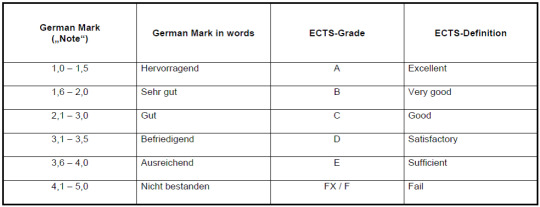
Levels
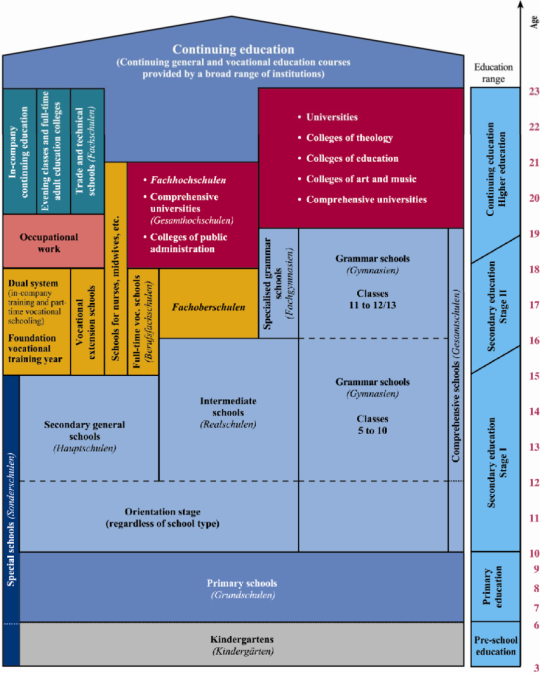
Preschool (Kindergarten)
Preschool education is neither mandatory nor free. Children between the ages of 2 and 6 attend Kindertagesstätte (Kita, “children’s daycare centers”). Many Kitas follow a certain educational approach, such as Montessori or Reggio Emilia.
Primary education (Primarstufe)
Primary education takes place in Grundschulen and generally lasts four years, from 6 to 10 years old. In Berlin and Brandenburg, it lasts six years.
Students are typically taught art, a foreign language (English or French), general studies (natural and social science), German, math, music, physical education, and religion or ethics.
Secondary education (Sekundarstufe)
Secondary education can take place in any of the following schools:
Gymnasium (grammar school) until grade 12 or 13 (ages 10–11 to 17–18/18–19), with Abitur as exit exam to qualify for university
Realschule (intermediate school) until grade 10 (ages 10–11 to 15–16), with Realschulabschluss
Hauptschule (secondary general school) until grade 9 or 10 (ages 10–11 to 14–15/15–16), with Hauptschulabschluss
Gesamtschule (comprehensive school) until grade 10 or 12/13 (ages 10–11 to 15–16 or 17–18/18–19)
The Gymnasium provides in-depth general education for university studies. Hauptschulen teach basic general education leading to vocational school or university entrance qualification. Realschule offers more extensive education than Hauptschule, leading to a vocational or university entrance qualification. A Gesamtschule combines all the aforementioned schools.
There are about twelve compulsory subjects in every grade: biology, chemistry, civics/social/political studies, up to three foreign languages, geography, German, history, math, music, physical education, physics, religion/ethics, and visual arts.
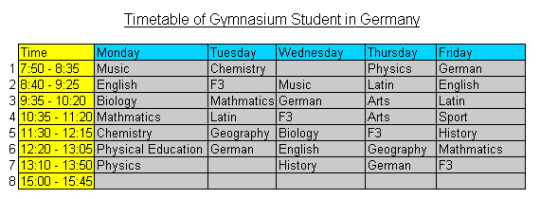
(F3 means Fremdsprache 3 [third foreign language], which is usually French or Spanish)
In grades 11–12/13, each student majors in two or three subjects (Leistungskurse), in which there are usually five lessons per week. The other subjects (Grundkurse) are usually taught three times a week.
Vocational training (Berufsbildung)
Vocational training lasts between two and three and a half years and can take place in any of the following types of school:
Berufsschule (vocational school): the standard type of vocational school, it prepares students for further vocational education or for a job in a profession. Apprentices attend school twice a week and spend the rest of the week working at a company, so they gain knowledge of theory and practice.
Berufsfachschule: similar to Berufsschule, it is aimed at people who want to study specific subjects, such as nursing or occupational therapy.
Fachoberschule (vocational high school): students who have obtained a Realschulabschluss or Hauptschulabschluss can attend a Fachoberschule, where they will specialize themselves in technology, economy, or administration and management, among other subjects. After completing the program, they can study for a university degree after passing the Abitur.
Berufsoberschule (upper vocational school): those who want to attend one need to have graduated from a Berufsschule. It provides in-depth education and training.
Higher education (Tertiärbereich)
To attend university, students need to pass the Abitur exams, of which at least one is oral. They are tested on four or five subjects, including their two or three Leistungskurse and two or three Grundkurse (German, math, and the first foreign language). All knowledge areas must be covered, including language, literature and the arts; social sciences; math, natural sciences and technology, and sports. Each semester of a subject studied in the final two years of Gymnasium yields up to fifteen points, where advanced courses may count double and final examinations count quadruple.
There are 380 universities in Germany, of which 114 are private. Public universities charge fees of around €150–350 per semester, which often include the cost of public transportation. Tertiary education institutions are classified into Universität or Hochschule. The former term is reserved for those which have the right to confer doctorates, in a similar distinction to universities and colleges in the United States. Fachhochschulen (Universities of Applied Sciences) are a type of Hochschule that concentrates on applied science and has a more practical profile with a focus on employability.
There are three types of admissions procedures for degree programs:
Free admissions: every applicant who fulfills the requirements is admitted. This is usually the case in programs in which many students quit, such as engineering, mathematics, or physics.
Local admission restrictions: only a limited number of places are available and students are admitting according to numerus clausus, whose criteria vary depending on the institution and the program but generally include the final grade of the Abitur, a weighted grade average that increases the weight of relevant school subjects, interviews, motivation letters, and/or letters of recommendation.
Nationwide admission restrictions: to study dentistry, medicine, pharmacy, or veterinary medicine, there is a nationwide numerus clausus in which applications are handled centrally for all universities.
There are three official university degrees: Bachelor (bachelor’s degree) takes three years to complete, Master (master’s degree) lasts two years, and Doktorat (doctoral degree or PhD) takes between two and five years.
Students can usually choose freely from all courses offered by the university, but all bachelor’s degree programs require a number of particular compulsory courses in the field of the study program.
62 notes
·
View notes
Text
Ever since I took a class on material culture and the significance of things and objects in our lives, I’ve started taking note of relevant readings I come across. For those interested, below is a partial list:
Objects of Despair: Inspired by Roland Barthes, Meghan O’Gieblyn’s monthly column examines contemporary artifacts and the mythologies we have built around them.
Fake Meat | Mirrors | Mars | Drones | The 10,000-Year Clock
Concrete: The Most Destructive Material on Earth (more on The Guardian’s “Concrete Week”)
The Unfortunate Fate of Childhood Dolls by Rainer Maria Rilke
AirPods Are a Tragedy
Thinging the Real: On Bill Brown’s “Other Things”
Sum Effects: “Personal or real, tangible or intangible, durable, hard, soft, consumable, or perishable: my grandmother owned none of it. Goldyne Alter died with no possessions.”
A janitor rescued migrants’ possessions from a border facility’s trash. Now they’re art.
Evocative Objects: Things We Think With, ed. by Sherry Turkle
Friendly Floatees
Great Pacific garbage patch
Plastic: an autobiography by Allison Cobb
Curating the Anthropocene: “Imagine a future archeologist on a dig in what was once downtown Los Angeles, excavating, exposing layers of history, like the paleontologists at the La Brea Tar Pits are doing today, finding bones of saber-toothed cats, mammoth, and dire wolves. What does the archeologist of the future find?”
18K notes
·
View notes
Text
speak your language day asks!
☾ : favourite word from your language ♧ : favourite word from the english language translated in your language ✌ : favourite proverb/saying from your language ☮ : translate the first lines of your favourite song in your language ☆ : give the first lines of a song which is originally in your language ☯ : what do you love about your language? ☪ : what do you hate about your language? ❀ : which language(s) would you like to speak fluently? ♡ : which languages do you speak/have you learned in school? ❁ : which language(s) do you think of as the most beautiful? ✓ : funniest word in your language ϟ : translate a sentence
28K notes
·
View notes
Text
i think one of the things that’s so fun about dracula daily is that it’s encouraging readers to have fun with the source material. i feel like there’s this pervasive idea that classics have to be taken very seriously and while they absolutely can be- sometimes it’s easier & more meaningful to read a classic like you’d read any other book. something i love about dd right now is that people are making memes about it and joking and i feel like the desire for levity is such a communal human urge. i just finished wuthering heights and it’s disappointing to go into the tag on here or any other website and see that it’s all #dark academia aesthetic posts. i feel like a lot of people are reading classics just to say they read the classics and i’m definitely guilty of that too sometimes. however, the more i read classics, the more i have fun with them! and i’m still able to engage with the complex themes of these novels while having fun. free urself from the idea of reading books the “right” way or the “smart” way. just read the books and have a good time! 🕺
2K notes
·
View notes
Photo
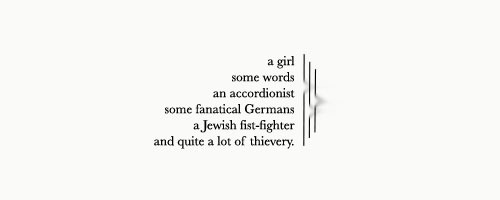
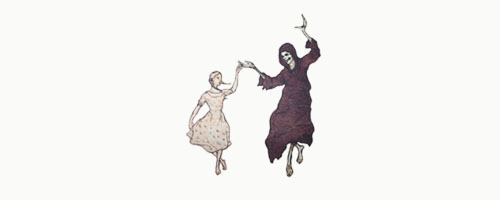
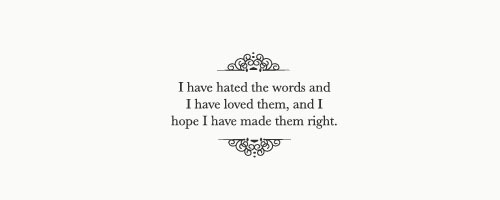
Fangirl Challenge - [1/5] Books - The Book Thief – by Markus Zusak
13K notes
·
View notes
Text
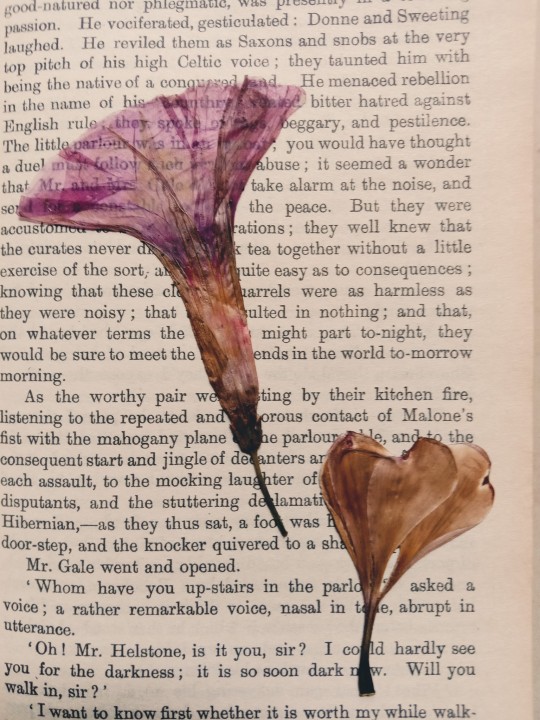

march 12, '23: happiness is when your students give you flowers. pressed flowers//
466 notes
·
View notes
Text
So internet archive lost their lower court case. They're appealing, and have a good chance with the 2nd circuit, but they need help. Here's a link directly from one of their librarians for how you can help.
20K notes
·
View notes
Text
Solidarity with children is often neglected or even made a joke of, so I wanna take a second and tell y'all what I wish I could go back in time and tell myself:
You're right. School is bullshit, homework is bullshit, waking up early is bullshit, going to bed early is bullshit. Some adults are just pointlessly cruel, even those in positions of authority over you. Sometimes adults are wrong, and, in fact, sometimes you are right
You were born with an innate sense of justice and fairness and adults have spent your entire life trying to beat it out of you so you'll shut up and do what you're told in an unjust and unfair society. Don't let them. Many of us have to take effort to relearn the wisdom you have right now, the ability to tell when something is bullshit even if you can't articulate why yet
You deserve happiness, fulfillment, and liberation just as much as any adult. Those first 18 years are just as important as any other time in your life, and it's time you'll never get back. Don't let anyone take them from you just because you're too young to fight back
Question everything, and never take "that's just the way it is" as an answer. Sometimes when things don't make sense to you it's because they just don't make any goddamn sense
Pick your battles, and be strategic. Don't take this post as permission to go starting fights for no reason. But remember that you have worth, and our society tends to not respect that. And you're right: that is bullshit
(also, read Anarchy Works)
47K notes
·
View notes
Text
sometimes i forget how reading is just. marvelous. just an absolutely fucking endlessly joyful activity. i’ll go about my life and not read one single book for months and be like why am i morose! why am i so apathetic! what is missing here!!!! and try to look for whatever it is that is lacking and never find it anywhere and i get so tired and sad and angry, and then i’m finally like i’m gonna stop everything for a couple days and read a really good book bc i don’t care about anything else. and suddenly i get motivated to work bc i know i’ll read when i’m on break. i get more creative. i want to watercolor again and bust out the shameful fabric stash with all my unfinished sewing projects. god even my dreams get more vivid!! what the fuck! and i’m like here is the magic i was looking for, why did i ever think i was going to find it anywhere else. it was always here!!!
26K notes
·
View notes




